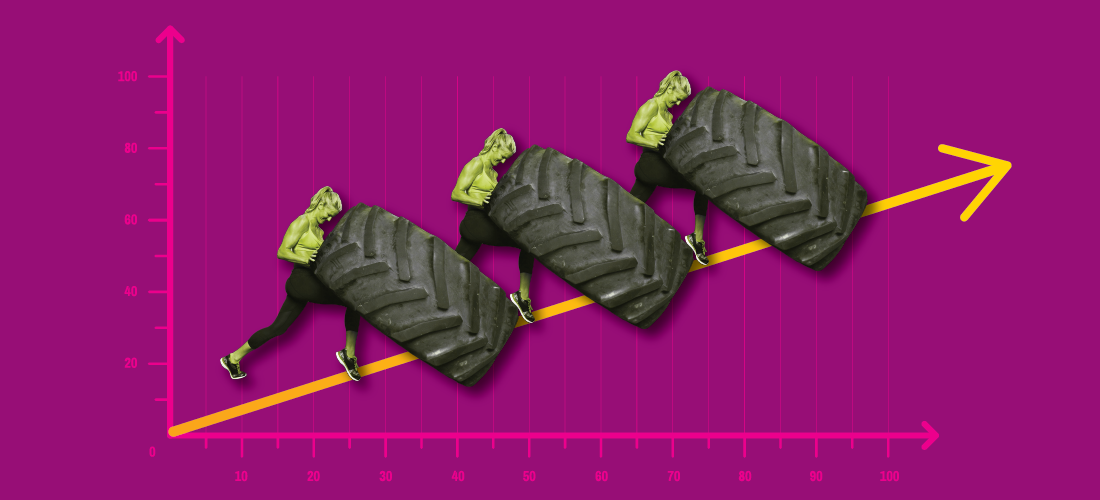You Can’t Rely on the Chalk: Why a Fixed Mindset Can Lead to Failure
About three years ago, I came across an ad on Instagram for a CrossFit gym in my community. The advertisement said that if I dedicated six weeks to CrossFit workouts and a healthier diet, I would see results. I had been traveling a lot for work, was bored with my gym routine, and felt like I needed a change. I signed up without really considering the hard work that might come from a sport I had never tried, and next thing I knew, I had committed to 6 a.m. workouts three days a week and changing my daily eating habits entirely.
I showed up that first day, unsure of what to expect, a little nervous, but ready to go. The workout wasn’t overly intense. The eating plan seemed doable. Then, I saw the athletes who regularly attended the gym showing up for their usual 7 a.m. class. They were applying large amounts of chalk to their hands before doing pullups, handstand walks, and rope climbs. They looked really serious and really intense.
I thought to myself, “Never mind. You can’t do CrossFit. Look at these people. You’ll never learn those skills or be that good. What’s the point?”
But because I had spent the money, I showed up for most of the six weeks of workouts, ate mostly within the prescribed guidelines, but wasn’t particularly motivated. On the last day of our challenge, we retested some of the skills we had tested on our first day and took our weight and measurements. I had seen almost zero changes.
I must have looked disappointed, because one of the coaches asked me why I had expected to see any changes if I didn’t believe I could do what was being asked of me.
He was right. Why would I have expected anything to change? I went into the six-week commitment with the belief that I couldn’t do what the other athletes were doing. I put this limitation on myself because I didn’t want to be embarrassed or look bad, and I was comparing myself to others around me. I had chosen to view this challenge as a threat rather than an opportunity. Of course I hadn’t seen progress; I had been operating with a “fixed mindset.”
The Power of a Growth Mindset
I went home that day, disappointed in myself. How could I ask my clients, top leaders of major organizations, or the students I taught at the community college, to commit to changing if I didn’t exercise this in my life outside of work? Change is hard. It takes time. I knew that. I tell people this for a living. I couldn’t believe I had shown up with an attitude that doomed me to fail.
So I drove back to the gym and signed up for an unlimited membership. I didn’t set lofty fitness goals or decide on some type of target weight loss. Instead, I decided to commit to attending classes regularly, asking for feedback and help, and being as consistent as possible with healthier eating. I learned that chalk is a helpful tool, but if you rely on it, you won’t build up the calluses over time that you need to help protect the vulnerable parts of your hands and conquer more difficult skills. If I wanted to see a transformation in my physical health, I needed to commit to consistency over a much longer timeframe than a six-week challenge. And, most importantly, I needed to believe it was possible. I needed to adopt a growth mindset. Exercising a growth mindset in the gym has spilled over into most aspects of my life since that time.
How to Make the Shift from a Fixed to a Growth Mindset
As I said earlier, any sort of change is tough. Humans intrinsically like to stick with what we know, and change is a big unknown. But I can attest – personally and professionally – that changing your mindset and your behaviors is often for the best. I saw it with my workouts and eating and I’ve seen it at work too.
Early on in my current role, I received some difficult feedback. My first thoughts were defensive – I saw it as a threat. I wanted to blame other people, ignore the feedback I was being given. After work, I went to the gym. As part of the workout, we attempted to set a new personal record (PR) for our deadlifts. I hadn’t improved my previous PR in some time and wasn’t sure I could do it, but after a couple of failed attempts (and a little chalk), I improved by adding over 10 pounds to my previous record.
Accomplishing this goal after a bit of failure helped me see what I needed to do with the feedback I had received at work. I needed to view it the same way I viewed progress in the gym. I went home and wrote a plan for how I could address each piece of feedback I was given. I shared that plan with other coworkers and peers. I continually asked for feedback and advice, shared when I was feeling overwhelmed and vulnerable, and stayed focused on moving forward. And, just like in the gym, I have tracked that progress, celebrated successes, and paused to think about my areas of growth.
I’m a consultant in my current role. I’m not a CEO. But, with a growth mindset, one day I might be.
“Exercising” a Growth Mindset
Over the past three years, I’ve attended approximately 780 CrossFit classes and competed three times. I’ve tracked a lot of my progress both inside and outside of the gym. I’ve set new personal records for almost every major lift we practice, improved my cardio to a level I’d consider better than at any other point in my life, and changed my body composition in a way that I’m really proud of.
I actively seek out feedback and coaching, rather than being worried about what others might think of me. When I do get feedback on where I need to improve, I try to apply it immediately and ask for feedback again. I realize there will always be someone better than me at the gym. However, instead of feeling defeated by these exceptional athletes, I try to work out alongside them as much as possible. If there’s a movement or an exercise I haven’t mastered yet, I ask for an option I can do now, but also simultaneously helps me reach my ultimate goal. If we’re given a choice of movements or exercises and one is harder for me than the other, I challenge myself with the more difficult one so I can get better. I also spend time in the gym outside of the listed class times. And I make sure to practice while I’m on the road for work, even if it means finding a stairwell to climb or doing a quick workout in my hotel room or at an airport during a layover. When someone gets to ring the “PR bell” in the gym, I celebrate their success and ask about their strategies and routines for success.
All of this tracking of success is important, but the only reason it’s possible is because I choose to exercise a growth mindset. And the funny thing is, the more I do this outside of my professional work, the more it becomes a way of working while I am with clients, students, or reflecting on my work at the end of the day.
Opportunities for growth exist all around us. Our capacity for growth is unlimited and infinite. How cool is that? Why spend any more time proving how great you are over and over again, when instead, you could be getting better? I challenge you to identify one area in your life where you can begin operating with a growth mindset.









